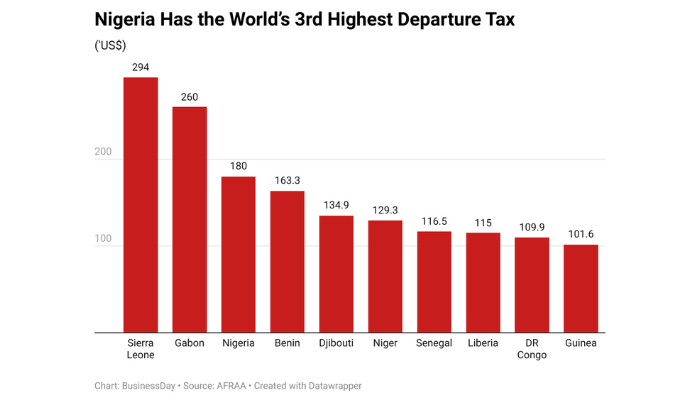Why Nigerian air passengers pay higher fares than regional peers
Nigerian air passengers are facing some of the highest fares in Africa, burdened by multiple taxes, fees, and levies imposed by government agencies and regulators.
As the aviation market recovers from the COVID-19 slump, Nigeria has continued to raise taxes to offset fiscal deficits, leading to higher operating costs for airlines and higher fares for passengers.
The most recent is the introduction of an extra $11.5 charge per ticket from December 1, 2025, by the Nigerian Civil Aviation Authority of Nigeria (NCAA).
The new levy is different from the $20 security levy introduced in 2010 by the apex body amid charges collected by the Federal Airports Authority of Nigeria (FAAN) and other aviation government agencies.
Read also: Why airlines enforce phone use rules for passengers- Expert
This new tax, known as the Advance Passenger Information System (APIS), is aimed at creating a ‘single window’ approach for all agencies at the airport, and the collection is expected to last for 20 years.
The NCAA stated that the system would help to track passenger movements, improve border control, and provide airlines with a cost-recovery mechanism for the system’s maintenance.
The initiative, which is in partnership with the Nigeria Immigration Service (NIS), would streamline passenger clearance at Nigerian airports by collecting and processing passenger data before arrival, the NCAA noted.
The memo stated that, “The APIS charge will be collected as a point of sale and will be levied on all tickets issued from December 1, 2025, for each passenger departing from or arriving in Nigeria. The lifting airline is responsible for remitting the APIS charge to the NCAA.
“Therefore, all airlines (including Nigerian carriers) operating international flights into and out of Nigeria are required to take immediate steps to update ticketing and reservation systems to reflect the new APIS charge, as invoicing for the charge will commence from 1st December 2025 for tickets issued to passengers from 01DEC2025 for travel to and from Nigeria.”
Besides the challenges of single ownership, poor governance, inadequate expertise, and unsuitable aircraft, domestic airlines in Nigeria are also hit by effects of unilaterally imposed taxes, fees, and charges, which further hurt their viability.
Data from the African Airlines Association (AFRAA) ranks Nigeria as the third most expensive country in Africa in ticket-related taxes, at $180 per ticket, behind Gabon ($297.70) and Sierra Leone ($294).
Meanwhile, government agencies continue to prioritise revenue generation without delivering commensurate value, industry stakeholders argue.
Meanwhile, every single flight is, in turn, exposed to other fees such as flight clearance, navigation, parking, or landing fees, etc. Other personnel and equipment-specific charges, such as licensing, training, aircraft certifications, insurance, etc., are also applicable.
These airlines still have to deal with operational expenses, including fuel, maintenance, and depreciation, amongst others.
If combined, taxes account for about 32.7 percent of domestic airlines’ gross revenues, which is a level far above global averages.
The world average of airline profitability is between 1.5 percent – 2.5 per cent for major carriers with size and scope.
Read also: Summer travels drives global air passenger demand higher in July
Industry voices
Roland Iyayi, former managing director of the Nigerian Airspace Management Agency (NAMA) and CEO of Top Brass Aviation, said the argument that passengers—not airlines—bear the taxes ignores the reality of suppressed demand.
“Who provides the capacity for the passengers? Government or private airlines? Whose loss is it when seats are flown empty, considering that these are perishable? Is demand suppressed by an increase in ticket price or not? Why are ticket prices not unbundled in this country? So many questions, yet no answers.
“Having successfully decimated the growth potentials of fixed-wing airline operations in the country, the focus has now shifted to the rotary wing aircraft for the final stage to be set for the demise of the domestic industry,” Iyayi said.
According to the AFRAA Taxes and Charges Study Review 2024, in Africa, air passengers pay on average 3.5 different taxes, charges, and for international departures, representing an average amount of $68.
In the top 10 most expensive countries in terms of ticket taxes, charges and fees, Gabon is the first with $297.7 taxes per international departure, followed by Sierra Leone with $294 taxes and Nigeria with $180 taxes. Niger, Benin, and Ghana are also part of the list. The less expensive countries for international departure ticket taxes are Libya, Malawi, Lesotho, and Algeria.
The list of 10 less expensive countries also includes Eswani, Tunisia, Botswana, Morocco, Sao Tome, Angola, and South Africa, which are countries with significant traffic. Out of 54 countries, 19 charge above the continental average; 14 charge passengers above $100 compared to 13 in 2022.Twenty-six countries charge $50 or more.
Obiukwu Mbanuzuo, former chief commercial officer at Green Africa, gave a further breakdown of the taxes and surcharges.
According to him, a one-way ticket sold by airlines, they pay a certain percentage to the Federal Airports Authority of Nigeria (FAAN) as a passenger service charge, and five per cent to the Nigeria Civil Aviation Authority (NCAA).
Read also: FG to compel public officials to fly Nigerian airlines abroad
From whatever is left, the airline also pays N2.50 for each litre of fuel to FAAN (via the marketer) and landing fees, which depend on the aircraft’s landing weight, he explained.
He said on every flight, airlines pay between N20,000 and N25,000 per ticket to the Nigeria Airspace Management Agency (NAMA) as terminal navigation charges and en route navigation charges to handlers, excluding other charges to airports for space rental at the check-in counters.

